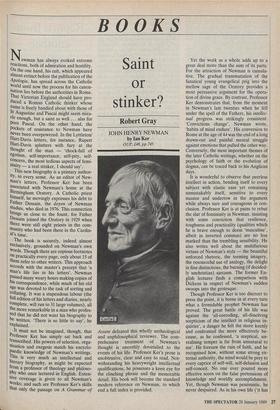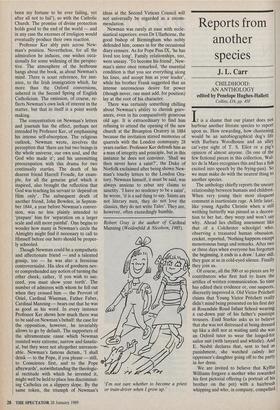BOOKS
Saint or stinker?
Robert Gray
JOHN HENRY NEWMAN by Ian Ker OUP, £48, pp.745 Newman has always evoked extreme reactions, both of admiration and hostility. On the one hand, his cult, which appeared almost extinct before the publication of the Apologia, has spread across the Catholic world until now the process for his canon- isation lies before the authorities in Rome. That Victorian England should have pro- duced a Roman Catholic thinker whose name is freely bandied about with those of St Augustine and Pascal might seem mira- cle enough, but a saint as well ... alas for poor Pascal. On the other hand, the pockets of resistance to Newman have never been overpowered. In the Lyttleton/ Hart-Davis letters, for instance, Rupert Hart-Davis splutters with fury at the thought of the man — 'chock-full of egotism, self-importance, self-pity, self- Concern, the most tedious aspects of femi- ninity — a real stinker, I should say'. This new biography is a primary author- ity, in every sense. As an editor of New- man's letters, Professor Ker has. been associated with Newman's home at the Birmingham Oratory. A Catholic priest himself, he movingly expresses his debt to Father Dessain, the doyen of Newman studies, who died in 1976. This connection brings us close to the fount, for Father Dessain joined the Oratory in 1929 when there were still eight priests in the com- munity who had been there in the Cardin- al's time.
The book is securely, indeed almost exclusively, grounded on Newman's own words. Though there are copious footnotes on practically every page, only about 15 of them refer to other writers. This approach accords with the master's precept that 'a man's life lies in his letters'. Newman passed many weary hours making copies of his correspondence, while much of his old age was devoted to the task of sorting and collating. It was a stupendous labour (the full edition of his letters and diaries, nearly complete, will run to 31 large volumes), all the more remarkable in a man who profes- sed that he did not want his biography to be written. 'There is so little to say', he explained.
It must not be imagined, though, that Professor Ker has simply sat back and transcribed. His powers of selection, orga- nisation and exegesis match his encyclo- paedic knowledge of Newman's writings. This is very much an intellectual and literary biography, as might be expected from a professor of theology and philoso- phy who once lectured in English. Exten- sive coverage is given to all Newman's works; and such are Professor Ker's skills that only the passage on A Grammar -of Assent defeated this wholly untheological and unphilosophical reviewer. The com- prehensive treatment of Newman's thought is smoothly dovetailed to the events of his life. Professor Ker's prose is unobtrusive, clear and easy to read. Not- withstanding his heavyweight intellectual qualifications, he possesses a keen eye for the clinching phrase and the memorable detail. His book will become the standard modern reference on Newman, to which end a full index is provided. Yet the work as a whole adds up to a great deal more than the sum of its parts. For the attraction of Newman is cumula- tive. The gradual transmutation of the fanatical young evangelical prig into the mellow sage of the Oratory provides a most persuasive argument for the opera- tion of divine grace. By contrast, Professor Ker demonstrates that, from the moment in Newman's late twenties when he fell under the spell of the Fathers, his intellec- tual progress was strikingly consistent. `Convictions change', Newman wrote, `habits of mind endure'. His conversion to Rome at the age of 44 was the end of a long drawn-out and painful mental struggle against emotions that pulled the other way. Conversely, the most important themes of the later Catholic writings, whether on the psychology of faith or the evolution of dogma, can be traced back to his Anglican days.
It is wonderful to observe that peerless intellect in action, bending itself to every subject with elastic ease yet remaining unmistakably itself, sensitive to every nuance and undertow in the argument while always sure and courageous in con- clusion. Professor Ker is at pains to rebut the slur of femininity in Newman, insisting with some conviction that resilience, toughness and practicality (qualities which he is brave enough to deem 'masculine', albeit in inverted commas) are no less marked than the trembling sensibility. He also writes well about the multifarious virtues of Newman's style — the beautiful unforced rhetoric, the teeming imagery, the resourceful use of analogy, the delight in fine distinctions, the burning (if decided- ly unchristian) sarcasm. The former En- glish lecturer finds a comparison with Dickens in respect of Newman's sudden swoops into the grotesque. Though Professor Ker is too discreet to press the point, it is borne in at every turn what a formidable prophet Newman has proved. The great battle of his life was against the 'all-corroding, all-dissolving scepticism of the intellect in religious in- quiries', a danger he felt the more keenly and confronted the more effectively be- cause, as he confessed, 'a sceptical, un- realising temper is far from unnatural to me'. He foresaw the ruin of faith, and he recognised how, without some strong ex- ternal authority, the mind would be prey to every caprice of self-will, self-delusion and self-conceit. No one ever poured more effective scorn on the false pretensions of knowledge and worldly accomplishment. Yet, though Newman was pessimistic, he never despaired. As in his own life (`it has been my fortune to be ever failing, yet after all not to fail'), so with the Catholic Church. The promise of divine protection holds good to the end of the world — and in any case the excesses of irreligion would eventually produce their own reaction.
Professor Ker ably puts across New- man's position. Nevertheless, for all the admiration he induces, one wishes occa- sionally for some widening of the perspec- tive. The atmosphere of the hothouse hangs about the book, as about Newman's mind. There is scant reference, for inst- ance, to the Irish immigration which, far more than the Oxford conversions, ushered in the Second Spring of English Catholicism. The omission, of course, re- flects Newman's own lack of interest in the matter, but that in itself is a point worth making.
The concentration on Newman's letters and journals has the effect, perhaps not intended by Professor Ker, of emphasising his intense self-absorption. The religious outlook, Newman wrote, involves the perception that 'there are but two beings in the whole universe, our own soul, and the God who made it'; and his unremitting preoccupation with this drama for two continually startles. The death of his dearest friend Hurrell Froude, for exam- ple, for all the genuine grief which it inspired, also brought the reflection that God was teaching his servant to 'depend on Him only'. The subsequent death of another friend, John Bowden, in Septem- ber 1844, a year before Newman's conver- sion, was no less plainly intended to 'prepare' him for 'separation on a larger scale and still more painful'. One begins to wonder how many in Newman's circle the Almighty might find it necessary to call to Himself before our hero should be proper- ly schooled.
Though Newman could be a sympathetic and affectionate friend — and a talented gossip, too — he was also a ferocious controversialist. His idea of goodness nev- er comprehended any notion of turning the other cheek; rather, 'if you wish to suc- ceed, you must show your teeth'. The number of admirers with whom he fell out when they crossed him — the Provost of Oriel, Cardinal Wiseman, Father Faber, Cardinal Manning — bears out that he was as good as his word. In every instance Professor Ker shows how much there was to be said on Newman's behalf: the case for the opposition, however, he invariably allows to go by default. The supporters of the ultramontane cause which Newman resisted were extreme, narrow and fanatic- al, but they were not altogether unreason- able. Newman's famous dictum, 'I shall drink — to the Pope, if you please — still, to Conscience first, and to the Pope afterwards', notwithstanding the theologic- al rectitude with which he invested it, might well be held to place less discriminat- ing Catholics on a slippery slope. By the same token, the triumph of Newman's ideas at the Second Vatican Council will not universally be regarded as a recom- mendation.
Newman was rarely at ease with eccle- siastical superiors: even Dr Ullathorne, the good bishop of Birmingham who nobly defended him, comes in for the occasional diary censure. As for Pope Pius IX, 'he has lived too long'. Family relationships, too, were uneasy. 'To become his friend', New- man's sister once remarked, 'the essential condition is that you see everything along his lines, and accept him as your leader', while his brother Frank suggested that an intense unconscious desire for power (though never, one must add, for position) lay at the root of his character.
There was certainly something chilling about Newman's ability to cherish griev- ances, even in his comparatively generous old age. It is extraordinary to find him refusing to attend the opening of the new church at the Brompton Oratory in 1884 because the invitation stirred memories of quarrels with the London community 28 years earlier. Professor Ker defends him as a man of integrity and principle, but in this instance he does not convince. 'Shall we then never have a saint?', the Duke of Norfolk exclaimed after being shown New- man's touchy letters to the London Ora- tory. Newman himself, it must be said, was always anxious to rebut any claims to sanctity. 'I have no tendency to be a saint', he wrote, 'it is a sad thing to say. Saints are not literary men, they do not love the classics, they do not write Tales'. They are, however, often exceedingly humble.
Robert Gray is the author of Cardinal Manning (Weidenfeld & Nicolson, 1985).
'I'm not sure whether to become a priest or train-driver when I grow up.'


















































 Previous page
Previous page